
More About Elimination Of Social Security Taxes Bill.
President Donald Trump asserts that the Republicans’ significant tax and expenditure reduction proposal will abolish taxes on federal Social Security payouts.
It does not exist.
Trump’s assertion of “no tax on Social Security” significantly amplifies the advantages for seniors should either the House- or Senate-approved measures be enacted.
This is an examination of Trump’s recent declarations and the implications of the ideas, whether he would enact or refrain from enacting specific changes.
Statements Made by Donald Trump

During his 2024 campaign, Trump consistently informed people that he would abolish taxes on Social Security. As his extensive legislation package progresses through Congress, the Republican president asserts that this is the bill’s intended purpose.
During a recent appearance on Fox News’ “Sunday Morning Futures,” Trump stated that the bill encompasses “no tax on tips, no tax on Social Security, and no tax on overtime.”
A Provisional Tax Deduction
Rather than abolishing the tax, both the Senate and House have approved distinct iterations of a provisional tax reduction for seniors aged 65 and above, applicable to all forms of income, not Social Security alone.
Not all Social Security beneficiaries will be eligible to claim the deduction. Individuals unable to do so encompass low-income seniors exempt from taxes on Social Security, those opting to claim benefits before age 65, and those exceeding a specified income threshold.

The Senate version features a temporary $6,000 discount for individuals aged 65 and older, in contrast to the House measure, which offers a temporary deduction of $4,000.
The Senate proposal approved on Tuesday would abolish Social Security tax obligations for seniors with adjusted gross incomes of $75,000 or less, or $150,000 for married couples filing jointly. Should it be enacted, the tax break would remain in effect for four years, spanning from 2025 to 2029.The deductions diminish as income rises.
The White House Emphasizes Its Influence.
The White House, referencing a recent analysis from the Council of Economic Advisers, stated on Tuesday that “88% of all seniors receiving Social Security will incur no tax on their benefits.” Additionally, it noted that the Senate proposal’s $6,000 senior deduction is projected to benefit 33.9 million seniors, including those not claiming Social Security.
The deduction results in an average enhancement of after-tax income amounting to $670 for each qualifying senior. Garrett Watson, director of policy analysis at the Tax Foundation, stated that mixing the tax deduction with the assertion that there will be no tax on Social Security may confuse and frustrate many seniors who anticipate not paying taxes on their Social Security income.
“Although the deduction offers some alleviation for seniors, it does not entirely abolish the tax on their benefits,” Watson stated.
Economic Impact
Eliminating the levy on Social Security would significantly affect the economy. The Penn Wharton Budget Model at the University of Pennsylvania estimates that abolishing income taxes on Social Security benefits would decrease revenues by $1.5 trillion over a decade and elevate federal debt by 7 percent by 2054, while also accelerating the anticipated depletion date of the Social Security Trust Fund from 2034 to 2032.
Debates regarding taxes on Social Security are merely a component of the comprehensive legislation, which the Senate version estimates will augment federal deficits by approximately $3.3 trillion from 2025 to 2034, as reported by the Congressional Budget Office.
Administration officials have stated that the expense of the tax legislation would be counterbalanced by tariff revenue. The CBO has projected that Trump’s extensive tariff plan would decrease deficits by $2.8 trillion over a decade, while simultaneously contracting the economy, increasing the inflation rate, and diminishing the aggregate purchasing power of families.





